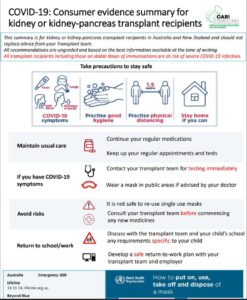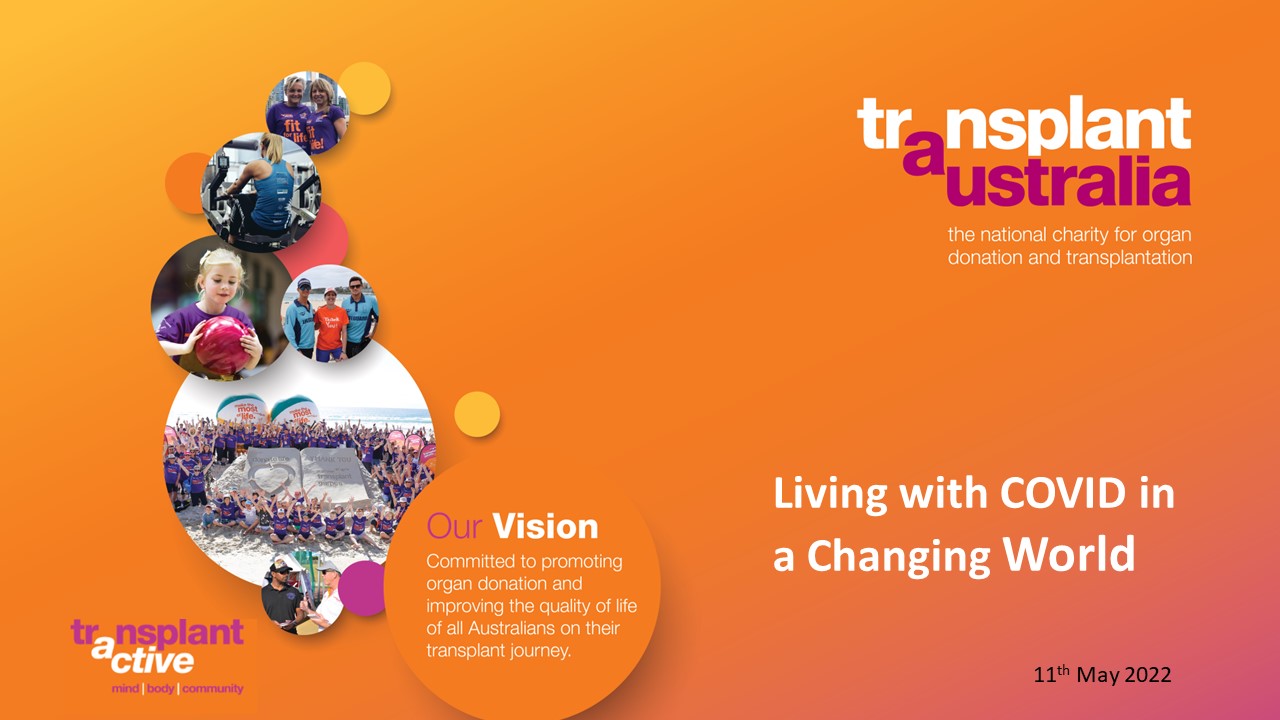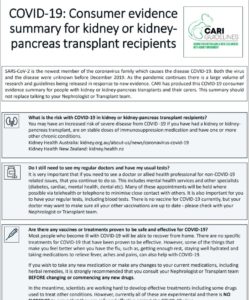
Advice for people at risk of coronavirus (COVID-19)
If you have any concerns regarding Covid-19 or vaccines, please speak with your transplant team.
The following information is taken from the Australian Government Coronavirus Website.
COVID-19: Consumer evidence summary for Kidney or Kidney-Pancreas Transplant Recipients
CARI COVID 19 Consumer Evidence Transplant Summary

CARI COVID 19 Consumer Evidence Transplant Summary – Infographic
Why this virus is so dangerous for older people and people with chronic medical conditions
The risk of serious illness from coronavirus increases if you are older or if you have a chronic medical condition.
The highest rate of fatalities is among older people, particularly those with other serious health conditions or a weakened immune system.
There is currently no cure or vaccine for coronavirus, or immunity in the community, so you need to make sure you protect yourself.
Protecting yourself
Good hygiene and taking care when interacting with other people are the best defences for you and your family against coronavirus. This includes:
- covering your coughs and sneezes with your elbow or a tissue
- disposing of used tissues immediately into a rubbish bin and washing your hands
- washing your hands often with soap and water, including before and after eating and after going to the toilet, and when you have been out to shops or other places
- using alcohol-based hand sanitisers (60% alcohol), where available
- cleaning and disinfecting surfaces you have touched
- stay 1.5 metres away — 2 arms’ length — from other people. This is an example of social distancing
- stay at home and avoid contact with others
- avoid non-essential travel
- consider having the chemist deliver your medicines
- consider having your groceries and essential items delivered to your home
Read our fact sheet about the support available to you if you are isolated and finding it difficult to access food and basic household items.
Symptoms
Symptoms include (but are not limited to) fever, a dry cough, tiredness, a sore throat and difficulty breathing.
If you develop mild symptoms of COVID-19:
- isolate yourself from others at home and use a separate bathroom, if available
- use a surgical mask when around other people. If you don’t have a mask, practise good sneeze/cough hygiene
- practise good hand hygiene
- call a doctor and tell them about your symptoms and whether you have had contact with someone diagnosed with COVID-19
If you have serious symptoms such as difficulty breathing:
- call 000, ask for an ambulance and notify the officers if you have been in contact with anyone with COVID-19
Chronic conditions that increase the risk of serious illness from COVID-19
The following chronic conditions are of concern in Aboriginal and Torres Strait Islander people over 50 years and vulnerable workers over 65 years:
- Chronic renal failure
- Coronary heart disease or congestive cardiac failure
- Chronic lung disease (severe asthma (for which frequent medical consultations or the use of multiple medications is required), cystic fibrosis, bronchiectasis, suppurative lung disease, chronic obstructive pulmonary disease, chronic emphysema)
- Poorly controlled diabetes
- Poorly controlled hypertension
People at any age with significant immunosuppression, as defined as:
- Haematologic neoplasms: leukemias, lymphomas, myelodysplastic syndromes
- Post-transplant: solid organ (on immunosuppressive therapy), haematopoietic stem cell transplant (within 24 months or on treatment for GVHD)
- Immunocompromised due to primary or acquired immunodeficiency (including HIV infection)
- Current chemotherapy or radiotherapy
- High-dose corticosteroids (≥20 mg of prednisone per day, or equivalent) for ≥14 days
- All biologics and most disease-modifying anti-rheumatic drugs (DMARDs) as defined as follows:
- Azathioprine >3.0 mg/kg/day
- 6-Mercaptopurine >1.5 mg/kg/day
- Methotrexate >0.4 mg/kg/week
- Prednisone >20 mg/day. If <14 days treatment, can resume work when treatment ceased
- Tacrolimus (any dose)
- Cyclosporine (any dose)
- Cyclophosphamide (any dose)
- Mycophenolate (any dose)
- Combination (multiple) DMARDs irrespective of dose
FAQs
Social Distancing
Keep your distance
One way to slow the spread of viruses, such as coronavirus, is social distancing (also called physical distancing).
The more space between you and others, the harder it is for the virus to spread.
In public
Social distancing in public means people:
- stay at home and only go out if it is absolutely essential
- keep 1.5 metres away from others
- avoid physical greetings such as handshaking, hugs and kisses
- use tap and go instead of cash
- travel at quiet times and avoid crowds
- avoid public gatherings and at risk groups like older people
- practise good hygiene
See important information on restrictions on public gatherings.
Households
All Australians are required to stay home unless it is absolutely necessary to go outside.
Australians are permitted to leave home for the essentials, such as:
- shopping for food
- exercising — in a public space such as a park, limited to no more than 2 people
- going out for medical appointments or to the pharmacy
- providing care or support to another person in a place other than your home
- going to work if you cannot work from home.
Australians should work from home where they can.
Steps for social distancing in all homes include:
- keeping visitors to a minimum
- regularly disinfecting surfaces that are touched a lot, such as tables, kitchen benches, hand rails and doorknobs
- increasing ventilation in the home by opening windows or adjusting air conditioning
If someone in your household is sick, you should:
- care for the sick person in a single room, if possible
- keep the number of carers to a minimum
- keep the door to the sick person’s room closed. If possible, keep a window open
- wear a surgical mask when you are in the same room as the sick person. The sick person should also wear a mask when other people are in the same room
- protect at-risk family members by keeping them away from the sick person. At-risk people include those aged over 65 years or people with a chronic illness. If possible, find them somewhere else to live while the family member is sick
At work
If you can, work from home. If you cannot work from home and you are sick, you must not attend your workplace. You must stay at home and away from others.
Steps for social distancing in the workplace include:
- stop shaking hands to greet others
- consider cancelling non-essential meetings. If needed, hold meetings via video conferencing or phone call
- put off large meetings to a later date
- hold essential meetings outside in the open air if possible
- promote good hand, sneeze and cough hygiene
- provide alcohol-based hand rub for all staff
- eat lunch at your desk or outside rather than in the lunch room
- regularly clean and disinfect surfaces that many people touch
- open windows or adjust air conditioning for more ventilation
- limit food handling and sharing of food in the workplace
- avoid non-essential travel
- promote strict hygiene among food preparation (canteen) staff and their close contacts
Information for employers and jobseekers is available on the Department of Education, Skills and Employment website.
In schools
If your child is sick, they must not go to school or childcare. You must keep them at home and away from others.
To reduce the spread of viruses or germs in schools:
- wash hands with soap and water or use hand sanitiser when entering school, and at regular intervals
- stop activities that lead to mixing between classes and years
- avoid queuing
- cancel school assemblies
- have a regular handwashing schedule
- regularly clean and disinfect surfaces that many people touch
- conduct lessons outdoors where possible
- consider opening windows and adjusting conditioning for more ventilation
- promote strictest hygiene among food preparation (canteen) staff and their close contacts
For more information on school operations, visit the Department of Education, Skills and Employment website.
Keep in touch with others
You can still keep in touch with loved ones while you practise social distancing:
- use video chats
- make phone calls to people you would normally catch up with in person
- use online groups to interact
- chat with neighbours while keeping 1.5 metres apart
- look after your mental health. Visit Head to Health for more information
Handwashing and respiratory hygiene
There are general principles you can follow to help prevent the spread of respiratory viruses, including:
- washing your hands more often – with soap and water for at least 20 seconds or use a hand sanitiser when you get home or into work, when you blow your nose, sneeze or cough, eat or handle food
- avoid touching your eyes, nose, and mouth with unwashed hands
- avoid close contact with people who have symptoms
- cover your cough or sneeze with a tissue, then throw the tissue in a bin and wash your hands
- clean and disinfect frequently touched objects and surfaces in the home
Symptoms
Symptoms
If you have serious symptoms such as difficulty breathing, call 000 for urgent medical help.
Symptoms include:
- fever
- coughing
- sore throat
- fatigue
- shortness of breath
If you are sick and think you might have COVID-19, check your symptoms using healthdirect’s Coronavirus (COVID-19) Symptom Checker.



